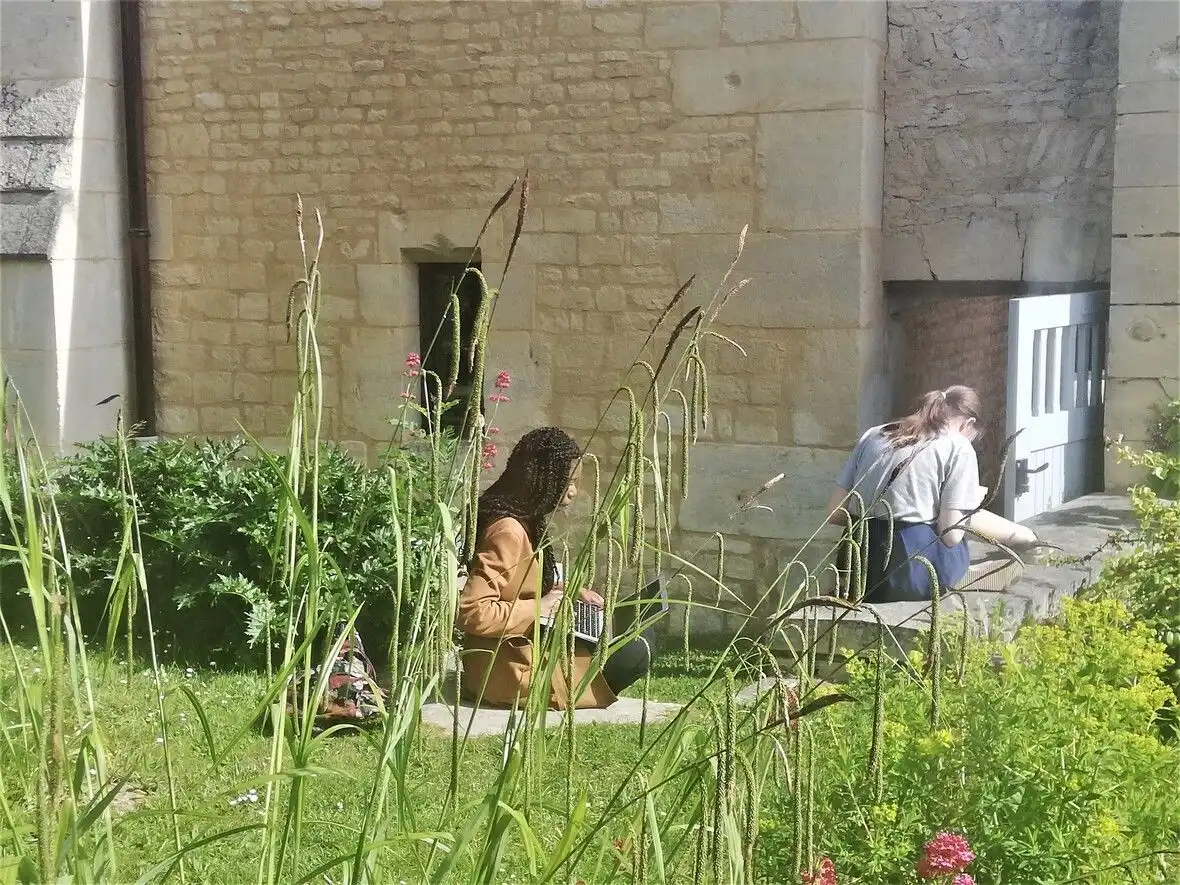Home>Writing residency: an immersive experience
24.06.2022
Writing residency: an immersive experience
The Center for Writing and Rhetoric (CWR) is a transformative pedagogical initiative that has been helping students acquire expressive skills and explore their creative potential since 2019. From Monday, 16 May to Friday 20 May, 2022, the CWR offered an original pedagogical project, thanks to the support of the Fondation Simone et Cino Del Duca, in the form of a week-long writing residence at the Institute for Contemporary Publishing Archives (Institut mémoires de l’édition contemporaine, or IMEC) at the Ardenne Abbey.
How to find a style, an idea, an inspiration when faced with a blank page? How are archives and writing woven together in creative writing? How do they intertwine? Simultaneously intense and creative, the week-long immersive session at IMEC focused on fusing imagination, stories, and research into a writing project. The goal was to help students make use of their creative writing skills, to encourage prolonged concentration in a space dedicated to creativity and the study of contemporary literature archives, and finally, to give students an opportunity to share their work and their thoughts.
For this first residency,15 Sciences Po students of varying profiles were selected, some in their first year of studies, others in their last. While they were all required to be fluent in French, certain students were Italian-Brazilian, Belgian-Lebanese, and Costa Rican. Not all had already completed a writing project. What was important was their interest in the setting and in research in general, as well as their desire to write, to find their voice, and to share it with others. As Lilou Margueron, a second-year student at Sciences Po’s Undergraduate College puts it, “I wanted to be able to have a time to write that wouldn’t just be for myself, and to share that experience with a variety of other people. I was also very enthusiastic about the idea of being able to write in an environment like an abbey, cut off from the world, where you can devote yourself entirely to that activity.”
Cut off from the world?
Far from the hectic pace of everyday life, in many respects virtually monastic, the residency opened students up to other rhythms, other words, and other sounds. It showed them, in practice, just how important technique, work, perseverance, and discipline are to writing… as well as relaxation and openness, inspiration, sharing, and reflection. The week thus offered a flexible and adaptable program that also had a rhythm and structure. Periods of research and inspiring encounters in the archives were mixed with group workshops where students participated in collective exercises, time to write alone, individual feedback on the texts, as well as walks on the abbey’s grounds.
The 15 students were guided in their work by two teacher-writers of the CWR, Julia Malye and Alexandre Galien, as well as the IMEC team and that of the CWR: Pomeline Tauziat, Esther Rogan, and Delphine Grouès. Nathalie Léger, the director of IMEC, also introduced students to this unique setting and the archives through a workshop focusing on the collections selected for this event: Gisèle Freund, Marguerite Duras and Danièle Collobert.
The students often used these literary personalities as backgrounds or characters in their narratives, as well as the inspiring setting of the IMEC: its stone buildings, its cedar tree, and its church. This studious and creative week was also punctuated by moments of inspiration, as when the students shared their favorite texts, reciting them out loud under the stars in the garden. The week ended on a review during an open literary café where students read the work they wrote during the residency out loud for an audience in the city of Caen.
More than a project, this week was an experience, in the fullest sense of the word. An enriching and transforming encounter, on a pedagogical, human, as well as academic level. It was an opportunity to decompartmentalise knowledge and break down silos, showing that rigor, liberty, imagination, and creativity can work hand in hand when they coexist in an atmosphere of trust that is conducive to exchange. As Maëva Regnaud, a first-year master’s degree student in Public Policy at the School of Public Affairs explained, “It was a very complete week in terms of developing skills, whether they were academic (researching archives, first drafts, revisions, etc.), interpersonal (extraordinary teamwork, enriching relationships with the authors guiding us in our work, encountering the CWR members who organized the week), or creative.”
Not all will become writers, but no matter which professional sector they choose, there is a good chance that they will need to write, to show critical thinking, and to be curious in order to go beyond what is asked of them. To be inspired, to enrich one’s thinking with others’ thoughts, to listen, to imagine, are all resources they can use to nourish their own ideas and career paths.
A second review of the week’s work is planned for the fall in Paris, which will provide an opportunity to hear the texts staged and read aloud, as well as to understand how an archive is constructed.
We will see you in autumn when we give pride of place to the work students created during this week. In the name of the writers and the CWR team, bravo to them all!
This article was written by Esther Rogan, head of the Center for Writing and Rhetoric.

